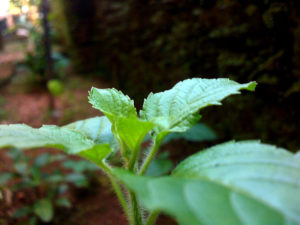
Tulsi – Herb With Awesome Positive Impacts
Natural herbs are the natural, safest and dependable source of healthcare and wellness in comparison to expensive synthetic drugs, having no adverse effects and Tulsi has been documented for its values since ages. Tulsi (Ocimum sanctum L) has been well documented for its therapeutic potentials and has the prospective to be a natural antibiotic. It holds an esteemed position in Indian mythology, religious practices because of its high medicinal value. Research proves that Tulsi with around 80% of antibiotic properties, its presence has an anti-viral impact on the environment, anti-bacterial protection against pathogens, and a great neutralizer of food toxins.
Immunity Boost
Tulsi has the property to resist disease and build up immunity to counteract disease. Hindustan Antibiotics uses Tulsi to manufacture its antibiotics. Studies have proved the impact of aqueous extract of Tulsi in reducing growth of Staphylococcus aureus, Klesbiella, E. coli & Proteus. While the alcoholic extract showed growth resistance for vibrio cholera and were also found to be active in multi drug resistance against S. aureus that is known to be resistant to common beta lactam antibiotics.
Holy Basil or Tulsi is one such herb that is very effective for the curing bacterial and fungal infections. Belonging to plant family Lamiaceae, the genus Ocimum, containing 200 species of herbs and shrubs, it is a source of fragrant mixtures and oils constituting biologically active elements having insecticidal and nematicidal properties. Tulsi extract and its active constituents are used majorly in traditional therapy. Around 60% of world’s populations still relies on traditional medicine based on plants like Tulsi, Neem etc. for their primary health-care needs.
Anti-Microbial Action
It has been strongly documented that Tulsi extracts having high potential as antimicrobial agent against micro-organisms, make the same very useful in the treatment of human diseases caused by bacterial or fungal organisms and have also been recommended as effective dietary supplement and immunity building agents to prevent and control the microbial infections.
Ayurveda Understanding
In Ayurveda, the ancient Indian science of healing, Tulsi has been referred to as “elixir of life” in ancient vedas and has been used extensively for its diverse healing properties. It has been mentioned in the ancient Ayurvedic text – Charaka Samhita for its varied adaptations in treatment of wide variety of diseases. Vedic texts classify Tulsi as an effective stimulant, aromatic & antipyretic herb. It has been recognised for its healing abilities, known to alleviate vata & kapha doshas, and is documented as Dashemani Shwasaharni (anti asthmatic) and antikaphic drugs (Kaphaghna).
Natural Adaptogen
Various studies have been documented on its positive impacts of Tulsi. Phytochemical studies (Junaid et al., 2006) of both dry and fresh extracts of Tusli (Ocimum gratissimum) discovered the existence of antimicrobial principles like cardiac glycoside, tannins, flavonoids saponins, steroidal terpens, glycosides, resins, and carbohydrates at different concentrations. Tulsi has been referred to as an adaptogen that is known to balance various processes in human body. Ayurveda uses it for alleviating cough, stress, indigestion, anorexia and to promote longevity. A study by Prakash and Gupta (2005) states that Tulsi is most effective in the treating arthritis, bronchitis, malaria, eye infections, insect bites, fever and asthma. Most recently studies have shown a positive impact on HIV (Human Immuno deficiency virus) and (AIDS Acquired Immune Deficiency virus) patients. Experiments by Lokhande and Khogare have shown positive results in treatment of Diabetes mellitus as hypoglycaemic effect.
Watch Video: How To Handle Seasonal Allergies Naturally?
About the Author:
Dr Sonica Krishan is Author and Speaker in the areas of Healthy and Joyous Living through Ayurveda, Meditation, Yoga and other Contemplative practices. She is a leading Ayurveda Professional in India. She is also Health Writer, Columnist, Editor, Ayurveda Consultant and Holistic Healing Coach. Dr Sonica is open for National as well as International Collaborations with interested people / institutions in fields of Ayurveda, Meditation and Yoga.www.drsonicakrishan.com
Dr Sonica Krishan’s Books are available at Amazon
Related Blogs:
Ayurveda Herbal Cures for Fibromyalgia
